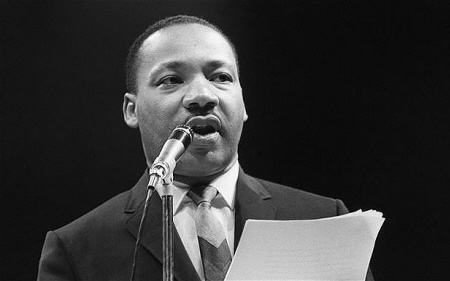Dr. Martin Luther King Jr. was the most important leader of the American civil rights movement. He helped unite a nation with his powerful speeches and use of non-violent protests. His 1963 “I Have a Dream” speech is one of the greatest in human history. King’s efforts to end racial discrimination earned him the Nobel Peace Prize in 1964.
馬丁·路德·金是美國著名人權運動領袖。通過“非暴力”抗議,慷慨激昂的演講,國家內部得以團結。1963年,馬丁發表《我有一個夢想》演講,這也是人類史上最偉大的演講之一。因對反種族歧視作出卓越貢獻,1964年授予馬丁諾貝爾和平獎。
King was born in 1929 in Atlanta. His father was a reverend and so King had a religious upbringing. He graduated from college with a degree and a Ph.D. in religious studies. King went to India to visit Gandhi’s family. He was inspired by Mohandas Gandhi's success with non-violent resistance and saw it as a “potent weapon” in America’s struggle for civil rights.
1929年,馬丁出生于亞特蘭大。父親是一名牧師,馬丁從小受宗教熏陶。他曾獲得神學博士學位。馬丁曾前往印度拜訪甘地。并受到甘地“非暴力”抗議啟發,對于馬丁來說,“非暴力”抗議將成為爭取民權的“有力武器”。

King was instrumental in achieving many successes in ending segregation laws. He led the Montgomery Bus Boycott which ended racial segregation on public buses in Montgomery. He realized that non-violent protest would attract extensive media coverage of the struggle for racial equality. His campaigns soon elevated the Civil Rights Movement to be the most important issue in American politics.
在廢除種族隔離法案上,馬丁起到了推動作用。他發起蒙哥馬利巴士抵制運動,“蒙市”巴士的種族隔離制度得以廢除。馬丁意識到,“非暴力”抗議能夠吸引媒體對種族平等的報道。不久,美國民權運動也成為了美國政壇的最重要話題。
King helped organize the famous March for Jobs and Freedom on Washington in 1963, where he spoke to the nation appealing for racial harmony. His non-violent protests met with success as Congress passed civil rights laws (1964) and voting rights laws (1965). King’s friendship with President John F. Kennedy also helped his cause. King was assassinated on April 4, 1968. Stevie Wonder pays tribute to King with his song "Happy Birthday".
1963年,馬丁發起“華盛頓工作與自由游行”,呼吁全國壯大“族裔和諧”。1964年,國會通過民權法案,1965年通過投票權法案,馬丁的“非暴力”抗議獲得成功。馬丁與約翰·肯尼迪的友情也助他一臂之力。1968年4月4日,馬丁遇刺。史提夫·汪達以一首《生日快樂》吊念馬丁。
來源:可可英語 http://www.ccdyzl.cn/Article/201603/432657.shtml











